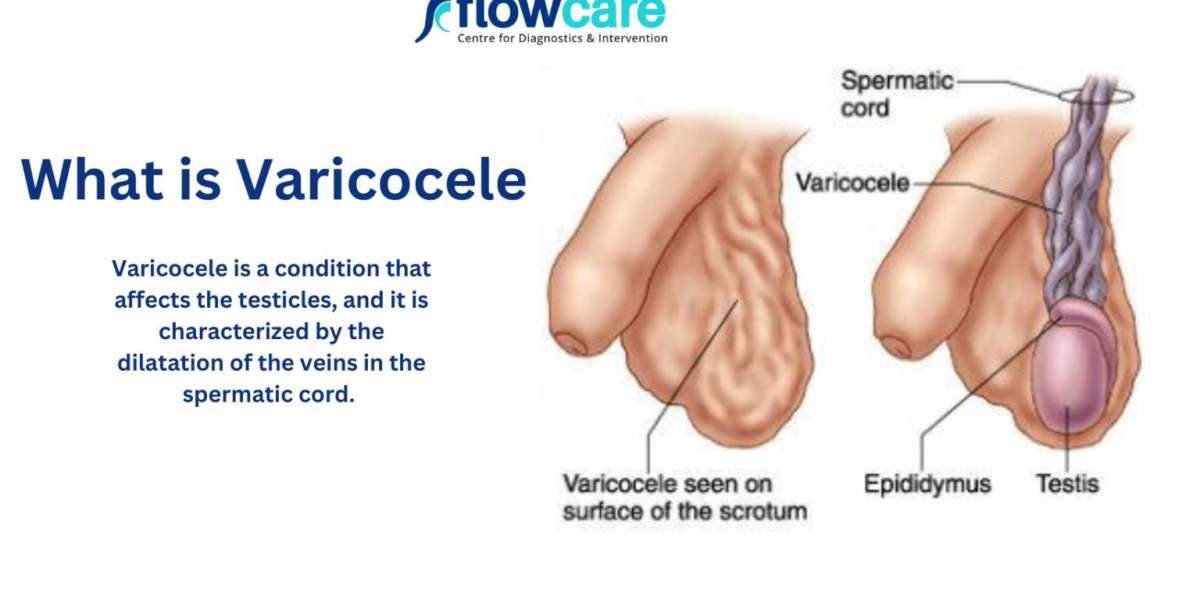Varicocele is a condition characterized by the enlargement of veins within the scrotum, similar to varicose veins that occur in the legs. This condition is often associated with male infertility and can affect sperm production and quality. Recognizing varicocele symptoms early is crucial for proper management and treatment. In this article, we will discuss the common symptoms of varicocele, how they impact male health, and the available treatment options offered by Flowcare.
What is Varicocele?
A varicocele occurs when the veins in the scrotum, known as the pampiniform plexus, become enlarged. This happens due to improper functioning of the valves within these veins, which leads to blood pooling and vein enlargement. Varicoceles are more common on the left side of the scrotum due to the anatomical differences between the left and right testicular veins.
Common Varicocele Symptoms
Varicocele symptoms can vary in severity and may sometimes be asymptomatic. However, when symptoms do occur, they can significantly affect a man’s quality of life and reproductive health. Here are the common varicocele symptoms to be aware of:
Dull, Aching Pain: One of the most commonly reported varicocele symptoms is a dull, aching pain in the scrotum. This pain may worsen after prolonged periods of standing or physical activity and is often relieved when lying down.
Scrotal Swelling: Varicocele can cause noticeable swelling in the scrotum. This swelling is often described as feeling like a “bag of worms” due to the enlarged veins. The swelling may become more pronounced after physical exertion or at the end of the day.
Testicular Discomfort: Men with varicocele may experience discomfort or a feeling of heaviness in the affected testicle. This discomfort may radiate to the lower abdomen or groin area.
Visible Veins: In some cases, the enlarged veins may be visible through the skin, especially when standing or during a physical examination. The veins may appear twisted or knotted.
Testicular Atrophy: Over time, varicocele can lead to testicular atrophy, where the affected testicle becomes smaller and softer. This is due to the reduced blood flow and increased temperature in the scrotum, which can damage the testicular tissue.
Fertility Issues: Varicocele is a leading cause of male infertility. It can affect sperm production, motility, and morphology, leading to difficulty in conceiving. Men with varicocele may have low sperm counts, poor sperm quality, or both.
Impaired Sexual Function: Some men with varicocele may experience sexual dysfunction, including reduced libido or erectile issues. This is often related to the discomfort and pain associated with the condition.
The Impact of Varicocele on Male Health
While varicocele is not life-threatening, it can have a significant impact on male health, particularly in terms of fertility and testicular function. The following are some of the ways in which varicocele affects male health:
Infertility: Varicocele is a common cause of male infertility, accounting for up to 40% of cases in men with primary infertility and up to 80% in men with secondary infertility. The condition leads to impaired sperm production and quality, making it difficult for couples to conceive naturally.
Hormonal Imbalance: Varicocele can disrupt the normal hormonal balance in men. Elevated scrotal temperature caused by varicocele can interfere with the production of testosterone, the hormone responsible for male reproductive function and libido.
Testicular Damage: Prolonged varicocele can result in testicular damage due to reduced blood flow and oxygen supply. This damage can lead to testicular atrophy and decreased sperm production.
Chronic Pain and Discomfort: For some men, varicocele can cause chronic pain and discomfort that affects their daily activities and quality of life. This pain may require medical intervention if it becomes severe.
Diagnosis of Varicocele
Diagnosing varicocele involves a physical examination by a healthcare provider, who will check for the presence of enlarged veins in the scrotum. In some cases, a Doppler ultrasound may be used to confirm the diagnosis and assess the severity of the condition. Early diagnosis is essential to prevent complications and initiate appropriate treatment.
Treatment Options for Varicocele
Flowcare offers a range of treatment options for varicocele, depending on the severity of symptoms and the impact on fertility. The following are common treatment methods:
Watchful Waiting: For men with mild varicocele symptoms and no fertility issues, watchful waiting may be recommended. Regular follow-up visits are essential to monitor any changes in symptoms or testicular health.
Varicocelectomy: Varicocelectomy is a surgical procedure to remove or tie off the enlarged veins in the scrotum. This procedure can be performed using open surgery, laparoscopy, or microsurgery. Varicocelectomy has a high success rate in improving fertility and alleviating pain.
Embolization: Embolization is a minimally invasive procedure in which a catheter is inserted into a vein in the groin or neck. A special substance or coil is then used to block the enlarged veins, redirecting blood flow and reducing varicocele symptoms.
Medications: While medications cannot cure varicocele, they may be prescribed to manage pain or address underlying hormonal imbalances. Pain relievers and anti-inflammatory drugs can help alleviate discomfort associated with varicocele.
Preventing Varicocele Complications
While there is no guaranteed way to prevent varicocele, there are steps men can take to reduce the risk of complications:
Maintain a Healthy Lifestyle: Regular exercise, a balanced diet, and avoiding smoking and excessive alcohol consumption can improve overall health and reduce the risk of developing varicocele.
Avoid Prolonged Standing or Straining: Men who are prone to varicocele should avoid activities that involve prolonged standing, heavy lifting, or straining, as these can exacerbate symptoms.
Regular Medical Check-ups: Regular check-ups with a healthcare provider can help detect varicocele early and prevent complications. Men experiencing symptoms of varicocele should seek medical attention promptly.
Conclusion
Varicocele is a common condition that can significantly impact male fertility and testicular health. Recognizing varicocele symptoms early is crucial for timely intervention and effective treatment. Flowcare offers a range of treatment options, from surgical procedures to minimally invasive techniques, to help men manage varicocele and improve their quality of life. If you suspect you have varicocele or are experiencing symptoms, consult with a healthcare provider to discuss the best treatment options for your condition.








